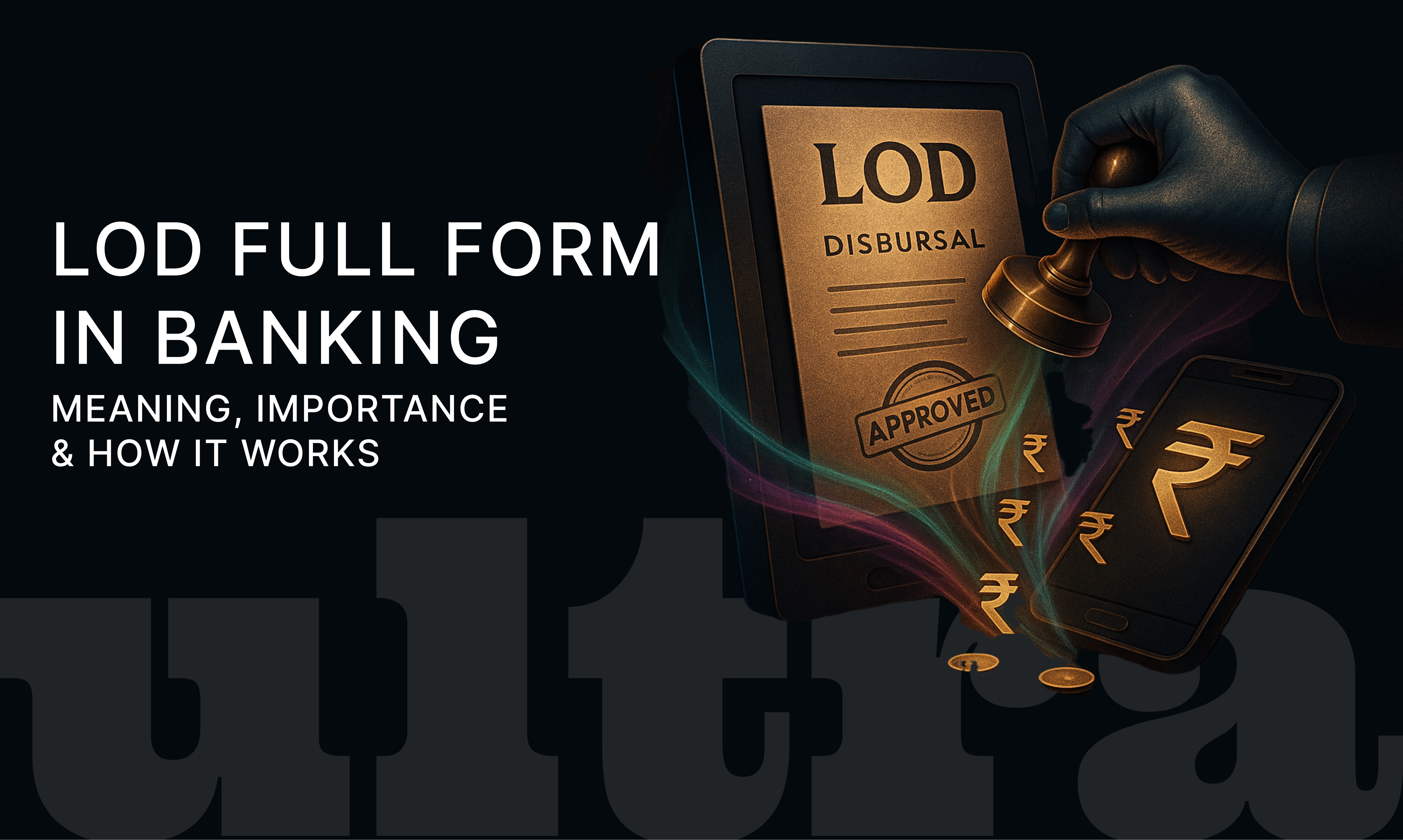LOD Full Form in Banking: Meaning, Importance & How It Works
25 July 2025 · Sachin Gadekar
Complete Guide to LOD (List of Documents) in Banking & Home Loans

What is LOD Full Form in Banking?
At Ultra, we make complex financial terms simple for everyone. If you have ever taken a home loan or plan to take one, you may come across the term LOD. Many borrowers often search for LOD full form in banking, LOD meaning, and its relevance when dealing with home loans and banks.
In this detailed guide, you’ll understand exactly what LOD means, why it matters, and how to use it wisely.
LOD stands for List of Documents in banking and finance. In the context of a home loan or any secured loan, a List of Documents (LOD) is an official statement provided by the bank or housing finance company (HFC) that lists all the original property documents submitted by the borrower as collateral against the loan.
LOD Meaning for Home Loans
When you apply for a home loan, the bank asks you to deposit original property papers — such as the sale deed, mother deed, encumbrance certificate, property tax receipts, occupancy certificate, approved building plan, etc. These documents remain with the bank until your loan is fully repaid.
The LOD is the record or acknowledgment issued by the bank to the borrower. It details exactly which original documents are held by the bank as security.
Why is LOD Important in Banking?
The List of Documents (LOD) is crucial for both borrowers and lenders for several reasons:
1. Proof of Collateral
LOD confirms which documents are in the bank’s custody. This helps avoid future disputes about which papers were deposited and ensures the borrower knows what’s with the bank.
2. Transparency
It creates transparency between the borrower and the lender. You know exactly which original documents are safe with the bank.
3. Required for Balance Transfers
When switching your home loan to another bank (loan balance transfer), you will need the LOD to show the new bank which documents are currently with the old bank.
4. Essential for Loan Closure
Once you fully repay your home loan, the lender will return all your original property documents mentioned in the LOD. It ensures you receive every original paper back.
When Should You Ask for LOD?
At the Time of Disbursement: Always request an LOD when your loan is sanctioned and disbursed.
During Balance Transfer: If you plan to transfer your loan to another bank, the new lender will ask for the LOD from your existing bank.
At Loan Closure: When you repay the final EMI, refer to the LOD to ensure you collect every original document.
How to Get an LOD from the Bank
Getting an LOD is simple:
Request in Writing: Write an application to your bank’s branch manager asking for the List of Documents.
Loan Account Details: Mention your loan account number and property details.
Processing Time: The bank typically issues the LOD within a few days.
Many banks and housing finance companies also offer a standard LOD format that you can fill and submit.
Things To Remember About LOD
What Happens if You Lose the LOD?
If you lose the LOD, you can apply for a duplicate from your bank. The bank may ask for a written application and identification documents to reissue it.
LOD and Balance Transfer
Many people choose to transfer their home loan to a new bank for better interest rates. In such cases, the LOD plays a critical role because:
It tells the new bank exactly which original property documents they will receive once the old bank is paid off.
It builds trust and ensures a smooth transfer of property papers.
Without an accurate LOD, balance transfers can get delayed.
Points to Remember About LOD
Always verify the LOD against your original documents before signing it.
Keep a copy of the LOD safely for your reference.
At loan closure, cross-check the returned documents with the LOD.
Ultra’s Tip for Home Loan Borrowers
At Ultra, we recommend every home loan borrower:
Maintain copies of all original documents.
Cross-check the LOD line by line.
Get the LOD updated if you submit any additional documents later.
A clear LOD saves you stress during loan closure or transfer.
FAQs on LOD Full Form in Banking
Q1: What is the full form of LOD in banking?
LOD stands for List of Documents, a record of original property papers held by the bank as security against a loan.
Q2: Why is LOD important for home loans?
LOD provides a clear list of documents held by the bank, ensures transparency, and protects borrowers during balance transfers or loan closure.
Q3: How do I get a List of Documents from my bank?
Submit a written request to your branch manager with your loan details. Banks generally issue it within a few working days.
Q4: Can I get a duplicate LOD?
Yes. If you misplace the original LOD, you can apply for a duplicate by submitting an application and ID proof to your bank.
Q5: Is LOD mandatory for balance transfer?
Yes. When switching your home loan to another lender, the new bank will ask for the LOD to check which documents they will get.
Final Thoughts
Understanding the LOD full form in banking helps every home loan borrower stay informed and protected. The List of Documents is your safeguard to ensure your valuable property papers are accounted for until your loan ends.
At Ultra, we empower you with knowledge so you can make confident money moves — whether you’re applying for a home loan, investing in bonds, or building wealth.
Stay tuned to ultra for more smart money guides like this!